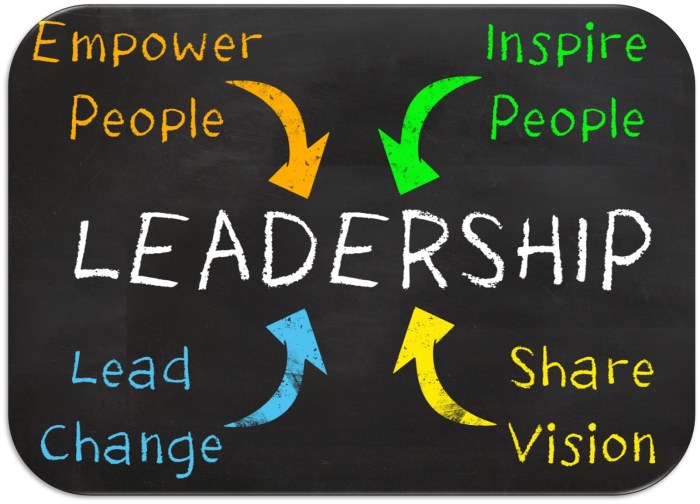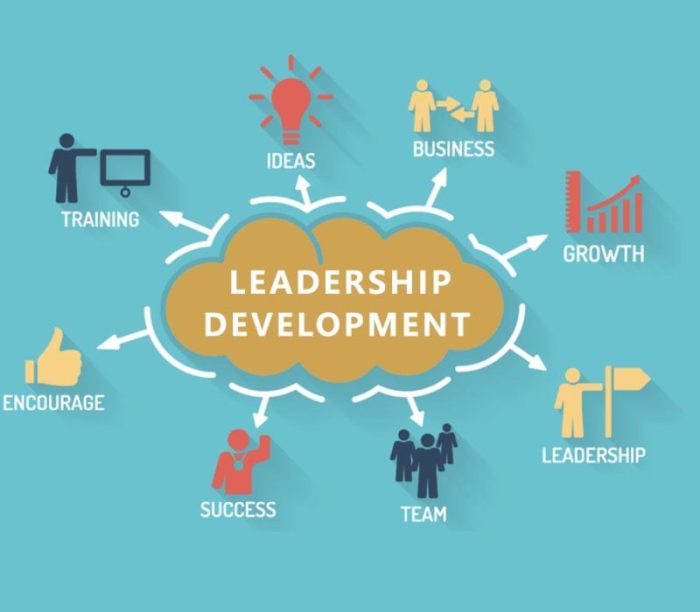Leadership Development sets the stage for growth and achievement. Get ready to dive into a world of dynamic programs, skill assessments, training workshops, mentoring, and models that shape leaders of tomorrow.
Leadership Development Programs
Leadership development programs play a crucial role in organizations by nurturing and enhancing the skills of future leaders. These programs are designed to identify and develop talented individuals within the company, preparing them for higher leadership roles.
Importance of Leadership Development Programs
- They help in creating a pipeline of skilled leaders who can drive the company’s success in the future.
- Leadership development programs foster a culture of continuous learning and growth within the organization.
- These programs boost employee morale and engagement, leading to higher retention rates.
Examples of Successful Leadership Development Programs
Google’s ‘Associate Product Manager’ program is known for grooming young talent into effective leaders within the tech industry.
General Electric’s ‘Crotonville’ leadership development institute has been instrumental in shaping top executives for decades.
Key Components of Effective Leadership Development Programs
- Mentorship and coaching to provide guidance and support to aspiring leaders.
- Structured training programs focusing on both technical and soft skills development.
- Ongoing feedback and performance evaluations to track progress and identify areas for improvement.
Leadership Skills Assessment: Leadership Development
In order to develop effective leaders, it is crucial to conduct a leadership skills assessment to identify strengths and areas for improvement. This process involves evaluating an individual’s abilities, behaviors, and attributes that contribute to successful leadership.
Critical Leadership Skills to Assess
- Communication Skills: The ability to clearly convey information, listen actively, and provide feedback.
- Decision-Making Skills: The capacity to make sound decisions, analyze situations, and consider various perspectives.
- Emotional Intelligence: Understanding and managing emotions, building relationships, and demonstrating empathy.
- Adaptability: Being flexible, open to change, and able to navigate challenges effectively.
- Problem-Solving Skills: The capability to identify issues, generate solutions, and implement strategies to address them.
Methods for Evaluating Leadership Skills
- Self-Assessment: Individuals reflect on their own leadership abilities and areas for growth.
- 360-Degree Feedback: Gathering input from supervisors, peers, and direct reports to provide a comprehensive view of leadership skills.
- Behavioral Interviews: Assessing past behaviors and experiences to predict future leadership performance.
- Psychometric Assessments: Using standardized tests to measure specific leadership traits and competencies.
Leadership Training Workshops
Leadership training workshops play a crucial role in professional growth by providing individuals with the skills and knowledge needed to lead effectively in various situations. These workshops offer a structured environment for participants to learn, practice, and refine their leadership abilities, ultimately leading to personal development and enhanced career opportunities.
Benefits of Leadership Training Workshops
- Enhanced Communication Skills: Workshops often include activities that focus on improving communication, active listening, and conflict resolution skills.
- Team Building: Through team exercises and group projects, participants learn how to collaborate effectively, motivate others, and build strong relationships within a team.
- Decision-Making Abilities: Simulations and case studies help individuals develop critical thinking and problem-solving skills, enabling them to make informed decisions under pressure.
Practical Activities in Leadership Training Workshops
- Role-Playing Scenarios: Participants take on different leadership roles in simulated situations to practice decision-making and conflict resolution.
- Feedback Sessions: Constructive feedback from peers and facilitators helps individuals identify strengths and areas for improvement in their leadership style.
- Real-Life Case Studies: Analyzing real-world leadership challenges allows participants to apply theoretical knowledge to practical situations.
Building Organizational Culture through Leadership Training Workshops
- Shared Values: Workshops promote the importance of shared values and a common vision within the organization, fostering a sense of unity and purpose among team members.
- Empowered Employees: By providing leadership training to employees at all levels, organizations empower individuals to take initiative, make decisions, and contribute to the company’s success.
- Sustainable Growth: Investing in leadership development through workshops ensures a pipeline of skilled leaders who can drive innovation, adapt to change, and lead the organization towards sustainable growth.
Mentoring and Coaching

In leadership development, mentoring and coaching play crucial roles in guiding individuals to reach their full potential and excel in their leadership roles.
Role of Mentoring and Coaching
Mentoring involves a more experienced individual providing guidance, support, and wisdom to a less experienced individual, helping them navigate challenges, develop skills, and grow professionally. On the other hand, coaching focuses on setting specific goals, providing feedback, and helping individuals improve their performance and achieve their objectives.
Differences between Mentoring and Coaching
- Mentoring is more long-term and relationship-focused, while coaching is usually short-term and goal-oriented.
- Mentoring involves sharing personal experiences and insights, while coaching focuses on improving specific skills and behaviors.
- Mentoring is usually informal and voluntary, while coaching is often formal and structured.
Designing a Mentoring Program Structure, Leadership Development
Creating a mentoring program within a company involves:
- Identifying potential mentors within the organization based on their experience, skills, and willingness to guide others.
- Matching mentors with mentees based on their goals, aspirations, and areas for development.
- Establishing clear expectations, goals, and timelines for the mentoring relationships to ensure accountability and progress.
- Providing training and resources for mentors to enhance their coaching and mentoring skills.
- Evaluating the effectiveness of the mentoring program regularly and making adjustments as needed to ensure its success.
Leadership Development Models

Leadership development models are frameworks that organizations use to cultivate leadership skills and behaviors in their employees. These models provide a structured approach to developing leaders and are essential for the long-term success of any organization.
Situational Leadership:
Situational leadership is a model that emphasizes the need for leaders to adapt their leadership style based on the readiness and capabilities of their followers. This model suggests that there is no one-size-fits-all approach to leadership and that effective leaders are those who can adjust their style to meet the needs of their team members. Strengths of situational leadership include its flexibility and focus on individual development. However, weaknesses may arise if leaders struggle to accurately assess the readiness of their followers or if they are not able to adapt their style effectively.
Transformational Leadership:
Transformational leadership is a model that focuses on inspiring and motivating followers to achieve a common vision or goal. Leaders who follow this model are charismatic, visionary, and able to create a sense of purpose and excitement among their team members. The strengths of transformational leadership lie in its ability to drive organizational change and foster innovation. However, weaknesses may arise if leaders become too focused on their vision and neglect the day-to-day operational needs of their team.
Organizational Adoption and Tailoring:
Organizations can adopt and tailor these leadership development models to suit their specific needs by assessing their current leadership capabilities and identifying areas for improvement. By customizing these models to align with their organizational culture and goals, companies can ensure that their leaders are equipped to drive success and achieve sustainable growth.
